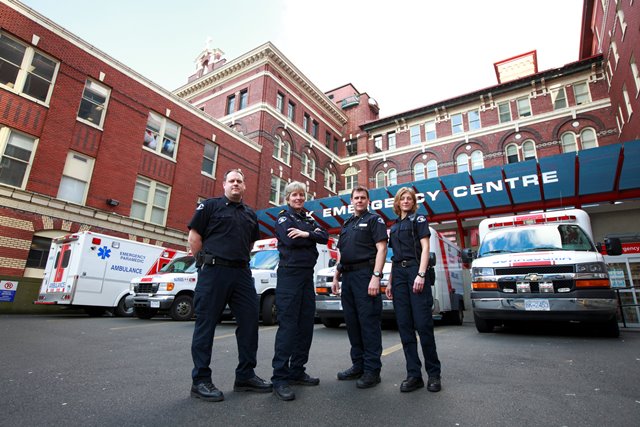
For the last three years, BC Emergency Health Services (BCEHS), which oversees the BC Ambulance Service and the BC Patient Transfer Network, has been pursuing organization-wide and industry-based accreditation to focus on best practises. But as one of the largest and most complex emergency pre-hospital care providers in North America, undertaking the detailed accreditation processes was a daunting task implemented in stages that relied heavily on staff participation throughout all organizational levels for success.
“The pursuit of accreditation further cements our commitment to patient safety and is aligned with our strategic goals to improve service,” said Jodi Jensen, BCEHS Chief Operating Officer. “The process helps BCEHS focus on continuous quality improvement which benefits our staff and patients. It’s another way for our staff to take pride in their work and validate their commitment to providing the best possible emergency pre-hospital care for British Columbians.”
Emergency Medical Services Accreditation
In June 2013, BCEHS achieved the Accreditation Canada Primer Award, the first step to full accreditation through the QMentum program, which focuses on quality of care and patient safety throughout all aspects of service—from governance and leadership to direct care and infrastructure. A team of ten Accreditation Canada surveyors visited BCEHS operations twice travelling throughout a cross-section of 184 ambulance stations, three dispatch centres as well as various program headquarters, reviewing performance, accountability, efficiency, clinical quality and risk management. The final accreditation survey is scheduled for October 2015.
MORE: EBOLA: IS CANADA PREPARED?
The standards measure all aspects of emergency pre-hospital care including finance, human resources, strategic planning, safe driving, emergency/disaster coordination, collaboration with health authorities and external stakeholders, quality improvement initiatives, clinical practices, medical oversight, risk management, vehicle safety, infection control and medical/transport equipment use and maintenance.
“Accreditation is highly valued by staff because it leads to organizational improvements and focusses on recognizing successes that lead to increased patient safety,” said Jensen. “The process encourages staff to meet or exceed emergency pre-hospital service standards at every opportunity.”
Canadian Medical Association Accreditation
The BCEHS Critical Care Program provides highly specialized, pre-hospital and inter-facility treatment and transport for patients across the province. BCEHS Critical Care Paramedics (CCPs) are the second busiest in North America.
In March 2014, the Critical Care Paramedic Education Program was recommended for accreditation by the Canadian Medical Association (CMA), becoming only the second CCP program in Canada to receive this distinction.
The pursuit of CMA accreditation led to significant changes. The program’s goals were clearly articulated, the curriculum significantly redesigned and the examinations retooled to better align with the goals, while students are now better supported with more study time, more simulation time, and more feedback. Core faculty members received significant professional development and are committed to ongoing compliance with CMA accreditation requirements.
As a part of the BCEHS commitment to improving service levels through accreditation, the CCP accreditation process will serve as a template for other medical education programs to pursue the same designation.
International Academy of Emergency Dispatch Accreditation
BCEHS manages three Dispatch Operations Centres in Kamloops, Vancouver and Langford from which all 9-1-1 emergency calls requiring medical assistance are received and responses are coordinated.
In May 2014 BCEHS Dispatch Operations was recognized by the International Academy of Emergency Dispatch (IAED) as an Accredited Centre of Excellence (ACE). With 186 ACE accredited emergency medical centres worldwide, this prestigious title is only awarded to the top emergency dispatch centres. BCEHS is the 12th Canadian organization with this designation and the largest, most complex dispatch operation in Canada to be awarded the accolade.
MORE: INFECTION CONTROL: HOW TO EDUCATE AND MOTIVATE
For IAED accreditation, Dispatch Operations had to meet 20 stringent criteria ranging from effective medical oversight, efficient auditing process and most importantly, an extremely high standard of 9-1-1 caller triage. The standards are 90 per cent and 95 per cent compliance to protocols in all areas including determining the chief complaint of the patient and providing lifesaving dispatch pre-arrival instructions to maintain the condition of the patient until the paramedics arrive.
“With three Dispatch Centres that cater to diverse populations and face distinct regional obstacles, meeting provincial operating standards consistently was a challenge,” explains Jensen. “The process led to the creation of patient safety huddles, which are short debriefing sessions held following each shift that help increase awareness of patient safety issues and allow staff to bring forward concerns in an informal manner.”
The Future of BCEHS Accreditation
Achieving accreditation is not the last step; it’s an ongoing process. The benefit of accreditation is that it encourages continuous introspective and organizational review to confirm to national or international standards for pre-hospital emergency medical care.
“Accreditation helps ensure we are following best practices for the benefit of our patients, coworkers and the organization,” says Jensen. “We’ll continue to explore and renew all the levels of accreditation we can to ensure the organization is consistently striving for the highest possible level of patient care and safety.”

